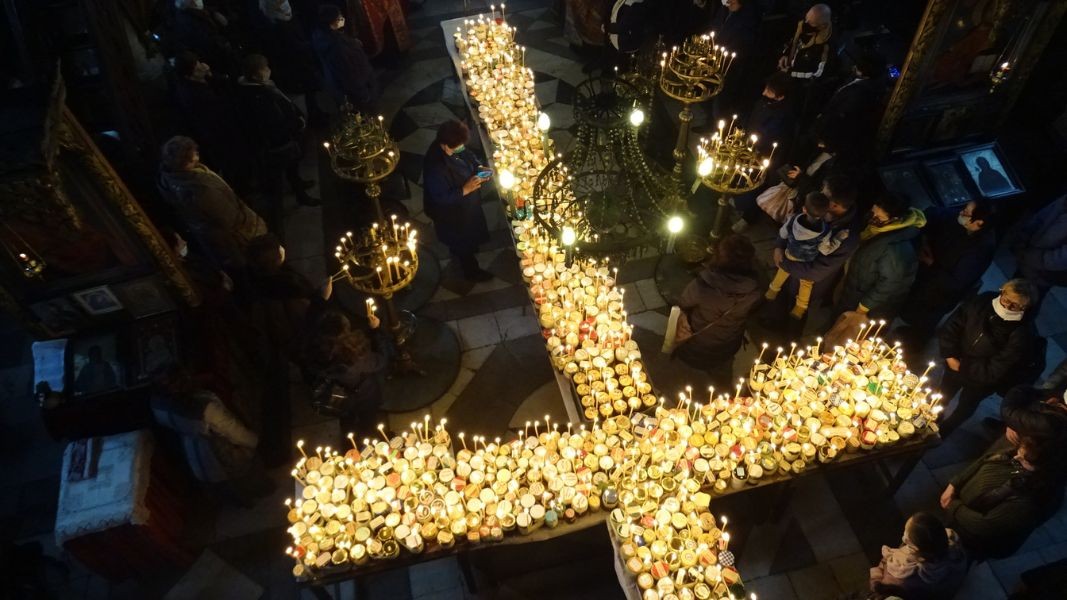
On February 10, the Bulgarian Orthodox Church honors the memory of Great Martyr Haralambos the Wonderworker who lived in the 2 century in Asia Minor. Saint Haralambos is regarded as patron saint of bees and apiarists, as since time immemorial people have relied on honey to cure all kinds of illnesses. Today, honey is sanctified in all Bulgarian Christian temples. It is believed that honey has a greater purifying and healing power when it is sanctified. Unfortunately, industrial agriculture has destroyed much of the lush meadows with blooming wildflowers and herbs. “Nature abounds in nectar. Bees use only 5% of it. The rest of the nectar is evaporated by the sun and washed away by the rain. The question is whether there are enough healthy bees to collect this nectar!” – said long-time beekeeper Georgi Georgiev who keeps bees on the outskirts of the capital city Sofia.

“Nectar is invisible to the naked eye. It is difficult to measure its quantities and beekeepers must intuitively choose the right moment to place the medium honey super. That is why beekeeping science is very specific. It requires in-depth knowledge. Beekeeping is not for everyone. I got acquainted with beekeeping when I was a student- one of my teachers took me to the local beekeeping society in my hometown of Novi Pazar. I have been actively involved in apiculture since 1987-1988. I found out that we can learn a lot from bees, because they are very hard-working. The bee colony is perfectly organized. According to researchers, bees appeared 50-150 million years ago. People think that bees sleep at this time of the year. That is not the case- now they are rearing a new generation which should be ready to start collecting nectar by March 22, when plants will be already blooming. Bees pollinate the plants which are a source of food for people and animals.”

“However, when we face so many difficulties and are unable to raise strong and healthy bee colonies, we can’t rely on beekeeping as a source of income”.
Beekeeping - an invaluable factor for health, yet not a priority sector for the Bulgarian state
Beekeepers are worried that Bulgarian honey holds the lowest purchase price in Europe
“Honey consumption should not be indiscriminate. We should regard honey as a medicine and reach for the spoon only when we are craving this product. Let us also make another point, we should hold it in our mouth for some time and imagine the following picture- trees are blossomming, everything is bathed in light, the plants abound with nectar and the bees are collecting it. We will significantly improve our health condition, if we establish a connection between the sun, the nectar, the bee and the honey”, beekeeper Georgi Georgiev contends.
A Christmas tree with Bulgarian decorations has been placed in a central location at the Griffin Museum of Science and Industry in Chicago. For the fifth consecutive year, Bulgarians living in Chicago crafted the lavish decoration of the Bulgarian..
The usurpation of cultural heritage is one of the many inevitable consequences of any military conflict, both historically and today. Until the end of the war in Ukraine, it is impossible to adequately analyse the extent of the damage caused to the..
Athens plans to modernise the Greek army by 2030 Greece's Defence Minister Nikos Dendias presented the plan for changes in the army to the parties in parliament. The reforms will cover all three branches of the military. By 2030, 33 units..
An innovation for the treatment of diabetic foot ulcer using the patient's own tissue and artificial intelligence has been implemented at the University..
The residents of Pleven (Central North Bulgaria) will bid farewell to 2024 with a Christmas Town and meetings with Santa Claus. This year's festive..
Modernizing critical thinking skills, fact-checking skills and media literacy are essential for society, especially for young people in Bulgaria - the..

+359 2 9336 661
